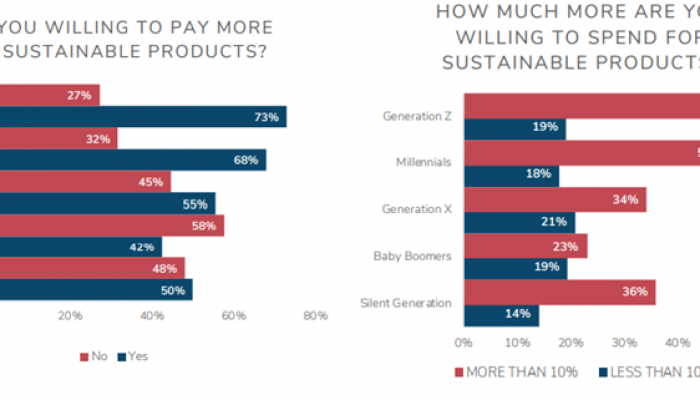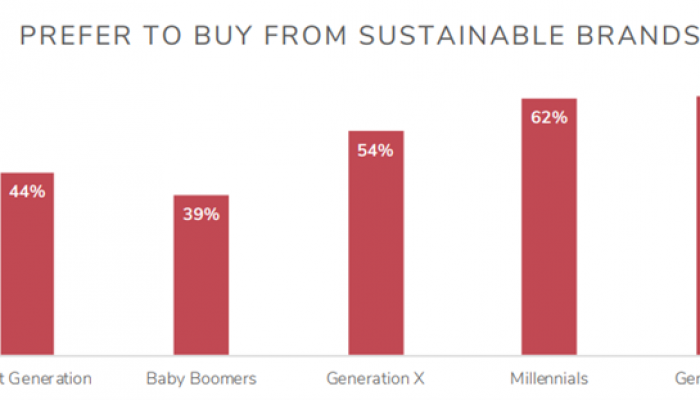“Marketing has been told time and time again that it is the source of problems of unsustainability,” says Dr. Victoria Hurth, fellow at the University of Cambridge Institute for Sustainable Leadership. This negative impact stems from concerns about the use of marketing spin to ‘greenwash’ supply chain and operations issues, while pushing a consumption and growth agenda over quality and durability.
However, “marketing also holds the key to turning the situation around”, says Hurth, who is part of the team at Cambridge behind an eight-week online course designed to help marketers and media creatives rethink their future role and find ways to “align marketing with a sustainable future”.
Realigning marketing to a sustainable business agenda is not just a nice-to-have, it’s increasingly becoming an vital aspect of strategic planning. This is the view of Astrid Ricketts, a Cambridge alumna and Middle East / Africa sustainability director for market research company Kantar.
“Marketing needs to change,” says Ricketts, stressing that for fundamental and widespread changes to be effective in a corporate setting, marketing has an integral role to play.
“But it starts with purpose and shared value, which is different from harvesting value and becomes instead about the value for society and business.”
A generational driver
Ricketts is only too well aware that it often takes a crisis point for human beings to be galvanised into change – and action. However, there is another push factor currently at play globally: the increasingly sustainable consumer patterns of the Generation Z (11- to 26-year-old) and Millennial (27- to 42-year-old) cohorts. Individuals in these generations vote with their wallets, and in accordance with their personal values. According to research from First Insight, three-quarters of Gen Zers surveyed in the USA (and almost the same number of Millennials) were prepared to spend more for sustainable products, while over half were willing to pay above 10% more for sustainable brands.
These insights point to an increasingly ethical and sustainability-driven generation, around which marketing and consumer messaging must evolve. These youngsters are, noted a recent Forbes article: informed, value-oriented, engaged, political, and willing to make decisions on where to live, work and study using a climate change lens. While those are broad descriptors, this new demographic is by no means uniform the world over.
Africa’s youth: A breed apart
For young Africans, for instance, sustainability takes on a different hue to that of their northern hemisphere contemporaries.
Ahead of the COP27 summit at the end of 2022, Uganda’s Evelyn Acham told Vogue magazine, “My country Uganda is experiencing extreme weather events like very long dry seasons, which dry up water sources and food, affecting food prices, leaving many with no food to eat or clean water to drink. The drought leads to other challenges, like women sourcing food and water from far-off places. This exposes them to other risks like trafficking, [as well as] sexual and domestic violence.”
In the same feature article, Raeesah Noor-Mohamed commented, “South Africa is facing a number of extreme climate-related events: heat waves, floods, droughts. Because of the lingering effects of colonialism and apartheid, the people in my country are already suffering and most of the population are ill-equipped to deal with additional crises.”
As Ricketts explains, for young Africans sustainability goes hand in hand with addressing social needs. Referencing age-specific data gathered for Kantar’s Sustainability Sector Index 2021, she notes that, “In Africa, if we are thinking of sustainability as a concept and [in terms of] the 17 sustainable development goals (SDGs), these are more in the social area than the environmental area.” This trend is consistent among Africans of all ages.
Stressing the importance of encouraging and listening to African solutions and innovations, Ricketts adds, “The conversation in Africa has to be different. To give an example, this whole idea of decarbonising the economy when you haven’t even carbonised yet … is almost offensive. We need to be able to have prosperity and development in a sustainable way. The global north didn’t do it, we cannot be the teachers, because we messed it up. So there has to be an African way, an African solution. And what is that going to look like?”
A different, social focus
Discussions around inequality and supporting Africa – and other emerging markets – on their green energy transition featured strongly in the build-up to COP27, including an Africa Finance Corporation white paper which Ricketts singles out, called Roadmap to Africa’s COP: A Pragmatic Path to Net Zero. This paper suggests an approach that focuses on developing local industries, building robust and resilient infrastructure and ‘finnovating’ (ensuring African institutions can access climate funds using financial innovation).
On the ground, however, the “big issues in Africa and the Middle East are poverty and hunger, really across all markets”, says Ricketts. For many in these regions, across age groups and LSM marketing categories, SDG 1 (eradicating poverty) and SDG 2 (zero hunger) are more important and immediate threats than “concerns around plastic waste in the oceans”.
In addition, says Ricketts, “Healthcare [during Covid-19] was a big one. Out of the more environmental/climate topics, water was the one that most people were concerned about, and air pollution or pollution in general. Linked to poverty and hunger was concern around the affordability of education, because people see education as a way out of the problems they are facing.”
This is not, she stresses, an indicator that Africans don’t care about sustainability – but they view SDG priorities differently.
“People in Africa see sustainability as a solution to economic power and economic growth,” says Ricketts, pointing to the value placed on local production and Africa-made brands and creativity, particularly among younger Africans. “They understand, for example, that locally produced things are not only good from an environmental point of view, but they also feed the local economy. So, the idea of local production and local manufacturing is huge.”
For brands and marketers this represents a significant opportunity. “We tell our clients all the time that if you’re an international corporate, the first thing you can do is to invest in the local economy in Africa,” says Ricketts. “You’re going to get value from it, but also consumers are going to thank you for it because you’re investing in the local economy. The idea of shared value between corporations, consumers and society is hugely important, especially in Africa, because it’s a very community-based culture.”
Trust and transparency
What is equally important is approaching consumer engagements with openness and honesty. It’s paramount, says Ricketts, noting that it must be supported by a clear corporate purpose. “It’s no longer enough to just produce a product, you have to have a purpose in society. You have to deliver shared value,” says Ricketts.
If companies are not honest about what they stand for and what problems they are going to solve, or if their public utterances don’t match up with actions, then consumers will call out these discrepancies. “Consumers are increasingly aware of this, so you have to be transparent,” says Ricketts. “If you’re not reaching the goals you set for yourself, just say it. Be honest about it. If you’re not honest about it, and it’s uncovered … that really damages brand equity.”
Even organisations well advanced on their sustainability journeys, such as Unilever, don’t always get it right, says Ricketts. However, the point is to let go of old paradigms and start on the journey.
As Cambridge’s Hurth said during a podcast discussion with marketing and sustainability commentator Neil Wilkins, “re-culturalising yourself to a new agenda is not an easy or quick process”. This applies to both individuals and organisations, and particularly to evolving corporate roles such as marketing, which Hurth describes as “the heartbeat of value creation for an organisation”.
If this beating heart isn’t in sync with the needs, hopes and aspirations of consumers – particularly those in the vocal younger generations – then companies have a problem. Greater alignment between corporate utterances and action is a clear solution, which means moving marketing beyond a mouthpiece role to that of value driver.
ESG and marketing strategy
ESG and sustainability are shifting the dial for marketers from a consumer-focused, growth and profitability mandate to one with a decidedly more strategic intent and with a focus on achieving alignment between purpose and the public face of a business.
Kantar’s Astrid Ricketts warns, however, that setting a sustainability strategy based solely on “internal opinions and agendas” is a hiding to nothing. It needs to be based on consumer evidence, industry insights and reality. Marketing, in turn, needs to uphold those values and that purpose, ensuring both internal and external alignment.
“We might think of marketing as advertising and sales,” Dr Victoria Hurth told The Neil Wilkins Podcast, “but maybe we are only thinking about it like that because business as usual has forced it to become that. And, actually, no organisation can deliver anything of value unless its value-creation nerve centre – i.e. marketing – is aligned in that direction with the value you want to create.”
To this end, Ricketts notes how important it is to “connect your sustainability strategy to what consumers expect from you and your category; it needs to be category specific. If you can connect those two things – consumer expectations and the focus areas of your broader business category – then then you get this perfect sort of strategy that is going to benefit you and the world.”
If you are uncertain about how to start tuning into fundamental drivers impacting your business category, then Hurth offers some sage advice. “You just need to read the World Economic Forum Global Risk Report and then go one level deeper than that and you are in that domain … because actually you are tapped into what is shaping what is going on,” says Hurth.
This sort of direction should serve as a beacon for marketers to better align their efforts with authenticity to ESG commitments and goals, be they social or environmental.
KEY TAKEAWAYS
- Marketing has been blamed for being the ‘source of problems of unsustainability’.
- Aligning the profession to support a sustainable future will require clear purpose and direction at a strategic level.
- Crises such as climate change are forcing a shift in consumer behaviours and company awareness, but another push factor is the younger Generation Z and Millennial consumers, who vote for sustainability with their wallets.
- While marketers should align messaging to an increasingly ethical and sustainability-driven youth generation, it is critical to note how views on sustainability differ around the world.
- In Africa, focusing on poverty and hunger – together with issues such as local production and community support – carry more weight than environmental concerns. This highlights the need to tailor marketing at a region and country level.








